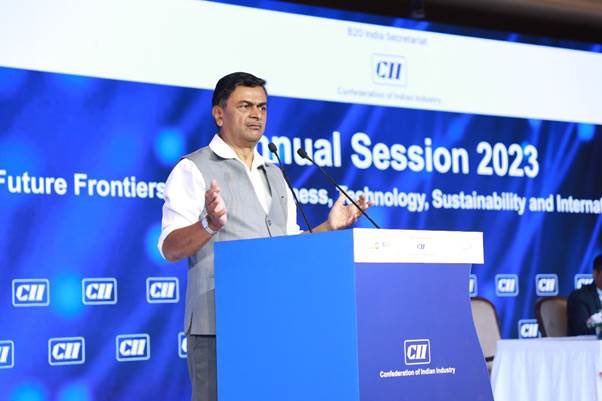India has advanced significantly in the field of renewable energy. As highlighted by Union Minister R. K. Singh, India had pledged to obtain 40% of its energy requirements from non-fossil fuels by 2030 but instead achieved this by 2021, nine years earlier. The Minister was addressing a plenary session on ‘Renewables – Powering the Net Zero Agenda of India’ at the CII Annual Session 2023 on May 25.
While addressing, the Minister also pointed out that the country's demand is rapidly growing, and by 2030, energy consumption is expected to double. “Net Zero is important, but what is more important is that we ensure enough electricity for our growth,” said the Minister.
In the last few decades, India has witnessed a very sharp increase in the demand for electricity. The ongoing process of urbanisation and industrialization in India has led to the growth of cities and the establishment of various industries. These urban areas and industries require a significant amount of electricity to power residential, commercial, and industrial activities. Moreover, rising incomes, infrastructure development, and technological advancements, among others, have also played a major role in this rise.
During the conference, the Minister assured the investors that India is one of the fastest growing countries with fast-growing energy demand, making it a big market for investors. “The demand is there, come and invest. We have addressed the challenges,” asserted the Minister.
Ensuring that the sector does not become vulnerable
In his address, the Minister criticised the practice of promising free power because ultimately taxpayers bear the brunt of it. “There is no such thing as free power, somebody has to pay for it. State Government which announce free power will have to pay for it from their budget.”
In addition, he also said that the government has put in place a system that if the discoms do not pay for the electricity they consume, the electricity will get cut off automatically, without any human intervention.
India is a world leader in the energy transition
The Indian government has set ambitious targets to increase the share of renewable energy in the overall electricity mix. The country has pledged that 50% of its capacity will come from non-fossil fuels by 2030.
India has been rapidly expanding its solar, wind, and hydropower capacities. Alongside promoting renewable energy, India is also focusing on energy efficiency measures to reduce overall electricity consumption. These efforts aim to reduce dependence on fossil fuels, mitigate the impact of climate change, and promote sustainable development.
Stating that hydro energy is environment-friendly, the Minister informed that results of surveys show that landslides have come down and slopes have stabilised where hydro projects came up. The Minister also said that India has one of the lowest costs of producing renewable energy in the world. The Minister made it clear that India is at the forefront of the transition, since “we believe in the environment”.
Speaking on nuclear power, the Minister said that the country welcomes nuclear power. “It is totally clean. Most developed countries have nuclear as a part of their equation when they contemplate Net Zero.”




















